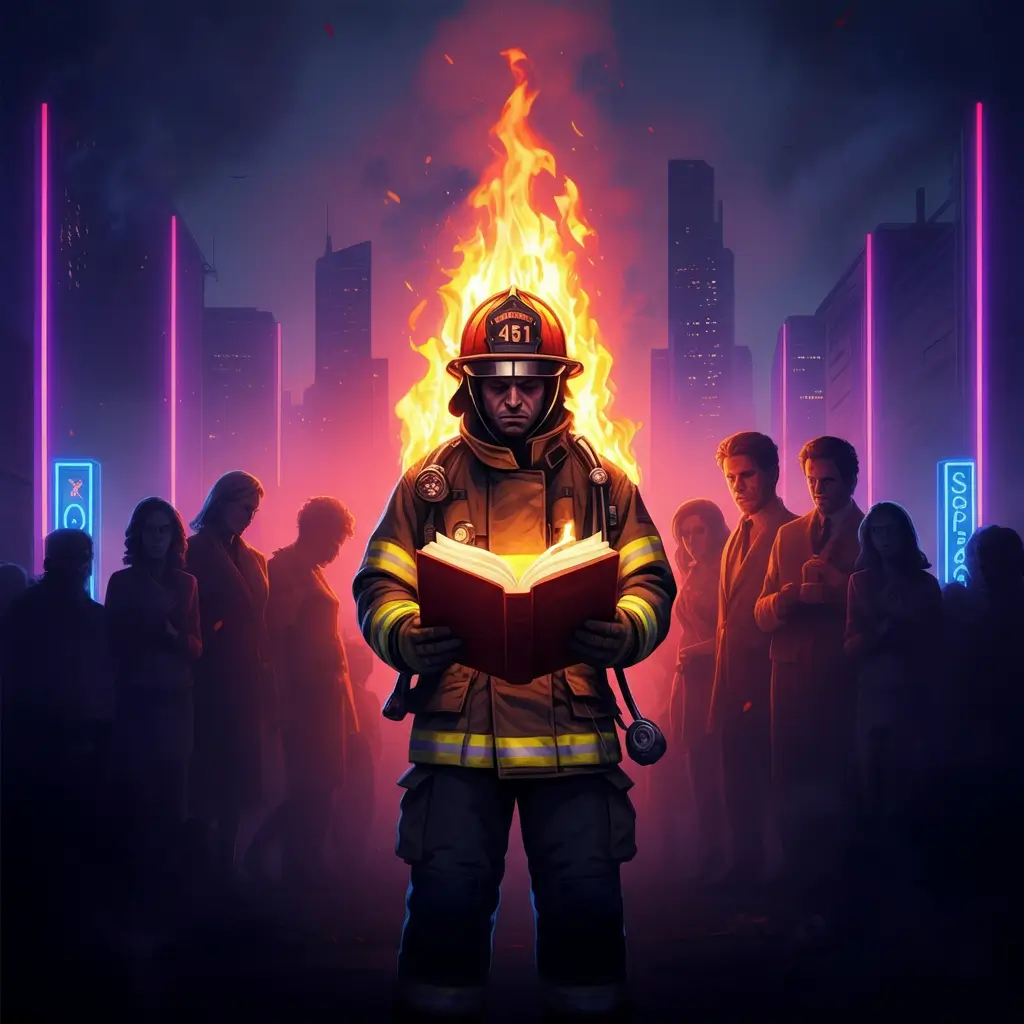Ray Bradbury’s Fahrenheit 451 is not just a story about censorship; it’s a warning about the loss of intellectual freedom and the consequences of conformity. Packed with thought-provoking quotes, the novel dives into complex themes of individuality, societal control, and the importance of human connection.
Whether you’re a high school student tackling an essay, a book club member searching for discussion points, or simply a literature enthusiast, this blog dissects key quotes alongside their meanings, shedding light on the deeper layers of this modern classic.
Key Quotes and Analysis from Fahrenheit 451
Clarisse McClellan: The Spark of Curiosity
Clarisse McClellan is the beginning of Guy Montag’s transformation. Through her curious and thoughtful questions, she challenges Montag to think beyond his monotonous life of burning books. One of her offhand yet powerful lines is:
“Are you happy?”
Though the question is deceptively simple, it shakes Montag to his core. Until this moment, he had never truly reflected on his state of mind or questioned the oppressive world around him. Clarisse, a free-spirited and independent thinker, represents everything the controlled and conforming society tries to suppress. Her ability to see beauty in the mundane and her insistence on asking “why” acts as the catalyst for Montag’s rebellion.
Clarisse’s character encourages readers to remain curious and introspective, asking themselves tough questions that challenge the status quo.
Guy Montag: From Conformity to Rebellion
Guy Montag’s transformation from a blindly following fireman to a questioning rebel lies at the heart of Fahrenheit 451. His thoughts and reflections act as a window for readers to understand the oppressive weight of censorship and propaganda.
One of the most iconic opening lines in literature belongs to him:
“It was a pleasure to burn.”
This chilling statement perfectly encapsulates Montag’s state of being at the beginning of the novel. As a fireman, he finds joy and purpose in burning books, which are seen as dangerous tools for independent thought. However, this “pleasure” comes from a deep conditioning by the society he lives in, which discourages critical thinking in favor of mindless entertainment.
Later, as Montag begins to evolve, he realizes the hollowness of his existence. He exclaims:
“Books aren’t people. You read and I look all around, but there isn’t anybody!”
This line captures Montag’s yearning for genuine human connection and understanding. The books represent more than just knowledge; they symbolize humanity’s collective voice, something his society has stripped away.
Captain Beatty: The Defender of Censorship
Captain Beatty, the antagonist, is one of Fahrenheit 451‘s most complex characters. Despite being an enforcer of censorship, Beatty has a remarkable understanding of literature, which makes his disdain for books even more striking.
Consider the quote:
“You must understand that our civilization is so vast that we can’t have our minorities upset and stirred.”
Here, Beatty justifies banning books by claiming that eliminating potentially offensive content creates peace and conformity. However, his argument unveils a darker truth about censorship—that it suppresses individuality and dialogue in favor of shallow harmony. This sentiment mirrors real-world debates about free speech versus the potential consequences of offending others.
Another significant quote from Beatty is:
“We must all be alike. Not everyone born free and equal, as the Constitution says, but everyone made equal.”
This twisted logic reflects the core of the novel’s dystopian society. Beatty articulates the dangers of forced equality and the erasure of uniqueness. It’s a chilling reminder of how authoritarian systems manipulate noble ideals like equality to maintain control.
Society and Censorship in Fahrenheit 451
Beyond its characters, Fahrenheit 451 Book is a sharp critique of society’s tendency toward censorship, materialism, and superficiality. The novel is full of lines that serve as reflections of a community governed by fear and control.
One of the most telling examples is when Montag observes:
“We need not to be let alone. We need to be really bothered once in a while. How long is it since you were really bothered? About something important, about something real?”
This statement highlights the damaging effects of a society that discourages critical thinking. By filling their lives with endless entertainment, the people in Bradbury’s world have lost the ability to engage with meaningful, thought-provoking content.
Bradbury’s warnings about censorship and the oversaturation of mindless media have only grown more relevant today. The novel challenges readers to reflect on the value of free thought and access to knowledge in preserving human dignity.
Why Fahrenheit 451 Matters Today
At its core, Fahrenheit 451 is a plea to safeguard individuality and intellectual freedom. Its iconic quotes reveal how censorship strips society of its humanity, fostering a culture of passive conformism over active engagement. Characters like Clarisse, Montag, and Beatty remind readers of the ongoing struggle between knowledge and control, between critical thinking and blind obedience.
This timeless classic speaks not only to high school students studying for exams but also to anyone who values the power of free thought. By dissecting its layers and understanding its quotes, we enhance our appreciation of Bradbury’s powerful message.
If you’re just beginning your exploration of Fahrenheit 451 or looking for deeper insights, return to these quotes as a guide to uncover the richness of Bradbury’s masterpiece.

Leave a Reply